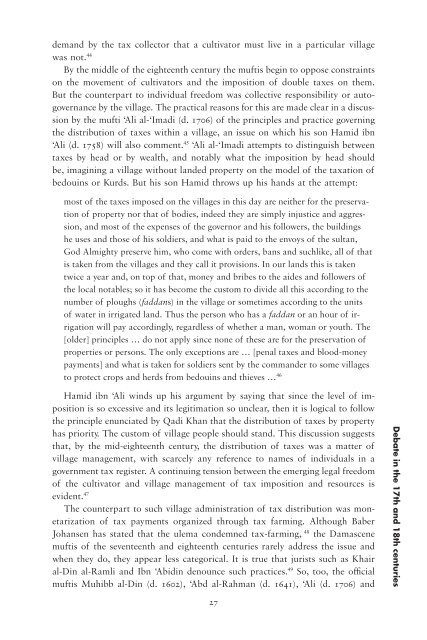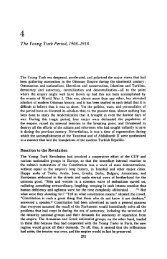Governing property, making the modern state - PSI424
Governing property, making the modern state - PSI424
Governing property, making the modern state - PSI424
You also want an ePaper? Increase the reach of your titles
YUMPU automatically turns print PDFs into web optimized ePapers that Google loves.
demand by <strong>the</strong> tax collector that a cultivator must live in a particular village<br />
was not. 44<br />
By <strong>the</strong> middle of <strong>the</strong> eighteenth century <strong>the</strong> muftis begin to oppose constraints<br />
on <strong>the</strong> movement of cultivators and <strong>the</strong> imposition of double taxes on <strong>the</strong>m.<br />
But <strong>the</strong> counterpart to individual freedom was collective responsibility or autogovernance<br />
by <strong>the</strong> village. The practical reasons for this are made clear in a discussion<br />
by <strong>the</strong> mufti ‘Ali al-‘Imadi (d. 1706) of <strong>the</strong> principles and practice governing<br />
<strong>the</strong> distribution of taxes within a village, an issue on which his son Hamid ibn<br />
‘Ali (d. 1758) will also comment. 45 ‘Ali al-‘Imadi attempts to distinguish between<br />
taxes by head or by wealth, and notably what <strong>the</strong> imposition by head should<br />
be, imagining a village without landed <strong>property</strong> on <strong>the</strong> model of <strong>the</strong> taxation of<br />
bedouins or Kurds. But his son Hamid throws up his hands at <strong>the</strong> attempt:<br />
most of <strong>the</strong> taxes imposed on <strong>the</strong> villages in this day are nei<strong>the</strong>r for <strong>the</strong> preservation<br />
of <strong>property</strong> nor that of bodies, indeed <strong>the</strong>y are simply injustice and aggression,<br />
and most of <strong>the</strong> expenses of <strong>the</strong> governor and his followers, <strong>the</strong> buildings<br />
he uses and those of his soldiers, and what is paid to <strong>the</strong> envoys of <strong>the</strong> sultan,<br />
God Almighty preserve him, who come with orders, bans and suchlike, all of that<br />
is taken from <strong>the</strong> villages and <strong>the</strong>y call it provisions. In our lands this is taken<br />
twice a year and, on top of that, money and bribes to <strong>the</strong> aides and followers of<br />
<strong>the</strong> local notables; so it has become <strong>the</strong> custom to divide all this according to <strong>the</strong><br />
number of ploughs (faddans) in <strong>the</strong> village or sometimes according to <strong>the</strong> units<br />
of water in irrigated land. Thus <strong>the</strong> person who has a faddan or an hour of irrigation<br />
will pay accordingly, regardless of whe<strong>the</strong>r a man, woman or youth. The<br />
[older] principles … do not apply since none of <strong>the</strong>se are for <strong>the</strong> preservation of<br />
properties or persons. The only exceptions are … [penal taxes and blood-money<br />
payments] and what is taken for soldiers sent by <strong>the</strong> commander to some villages<br />
to protect crops and herds from bedouins and thieves … 46<br />
Hamid ibn ‘Ali winds up his argument by saying that since <strong>the</strong> level of imposition<br />
is so excessive and its legitimation so unclear, <strong>the</strong>n it is logical to follow<br />
<strong>the</strong> principle enunciated by Qadi Khan that <strong>the</strong> distribution of taxes by <strong>property</strong><br />
has priority. The custom of village people should stand. This discussion suggests<br />
that, by <strong>the</strong> mid-eighteenth century, <strong>the</strong> distribution of taxes was a matter of<br />
village management, with scarcely any reference to names of individuals in a<br />
government tax register. A continuing tension between <strong>the</strong> emerging legal freedom<br />
of <strong>the</strong> cultivator and village management of tax imposition and resources is<br />
evident. 47<br />
The counterpart to such village administration of tax distribution was monetarization<br />
of tax payments organized through tax farming. Although Baber<br />
Johansen has <strong>state</strong>d that <strong>the</strong> ulema condemned tax-farming, 48 <strong>the</strong> Damascene<br />
muftis of <strong>the</strong> seventeenth and eighteenth centuries rarely address <strong>the</strong> issue and<br />
when <strong>the</strong>y do, <strong>the</strong>y appear less categorical. It is true that jurists such as Khair<br />
al-Din al-Ramli and Ibn ‘Abidin denounce such practices. 49 So, too, <strong>the</strong> official<br />
muftis Muhibb al-Din (d. 1602), ‘Abd al-Rahman (d. 1641), ‘Ali (d. 1706) and<br />
27<br />
Debate in <strong>the</strong> 17th and 18th centuries












